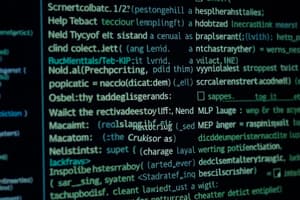Podcast
Questions and Answers
What is the goal of Natural Language Processing?
What is the goal of Natural Language Processing?
- To program computers to process and analyze large amounts of natural language data
- To study the interactions between computers and human language
- To extract information and insights contained in the documents
- All of the above (correct)
Which of these is not a challenge faced by NLP?
Which of these is not a challenge faced by NLP?
- Machine learning algorithms (correct)
- Natural-language generation
- Speech recognition
- Natural-language understanding
What are the three types of NLP mentioned in the text?
What are the three types of NLP mentioned in the text?
- Symbolic, statistical, and neural (correct)
- Hand-coded, statistical, and neural
- Symbolic, machine learning, and neural
- Hand-coded, machine learning, and statistical
What is the difference between symbolic and statistical NLP?
What is the difference between symbolic and statistical NLP?
What are some of the most commonly researched tasks in NLP?
What are some of the most commonly researched tasks in NLP?
What fields have applications of NLP?
What fields have applications of NLP?
What is the future of NLP expected to focus on?
What is the future of NLP expected to focus on?
What are some of the challenges faced by NLP?
What are some of the challenges faced by NLP?
What are some of the tools and platforms developed as a result of NLP research?
What are some of the tools and platforms developed as a result of NLP research?
Flashcards
What is the goal of NLP?
What is the goal of NLP?
The goal of NLP is to enable computers to understand, interpret, and generate human language, just like humans do.
Which is NOT a challenge faced by NLP?
Which is NOT a challenge faced by NLP?
Machine learning algorithms are a powerful tool used within NLP, not a challenge.
What are the three types of NLP?
What are the three types of NLP?
Symbolic, statistical, and neural represent three distinct approaches to NLP.
What is the difference between Symbolic and Statistical NLP?
What is the difference between Symbolic and Statistical NLP?
Signup and view all the flashcards
What are some commonly researched tasks in NLP?
What are some commonly researched tasks in NLP?
Signup and view all the flashcards
What fields have applications of NLP?
What fields have applications of NLP?
Signup and view all the flashcards
What is the future of NLP expected to focus on?
What is the future of NLP expected to focus on?
Signup and view all the flashcards
What are some challenges faced by NLP?
What are some challenges faced by NLP?
Signup and view all the flashcards
What are some tools and platforms developed as a result of NLP research?
What are some tools and platforms developed as a result of NLP research?
Signup and view all the flashcards
Study Notes
Natural Language Processing: A Fusion of Linguistics and Computer Science
- Natural language processing (NLP) is an interdisciplinary field that combines linguistics, computer science, and artificial intelligence to study the interactions between computers and human language.
- The goal of NLP is to program computers to process and analyze large amounts of natural language data, understand the contextual nuances of the language, and extract information and insights contained in the documents.
- Some of the challenges in NLP include speech recognition, natural-language understanding, and natural-language generation.
- NLP has its roots in the 1950s, and it has undergone multiple changes, including symbolic, statistical, and neural NLP.
- Symbolic NLP involves the hand-coding of rules and a dictionary lookup, while statistical NLP relies on machine learning algorithms to analyze large corpora of typical real-world examples.
- Neural NLP uses neural networks for machine learning, which have largely replaced statistical methods since 2015.
- The most commonly researched tasks in NLP include morphological analysis, syntactic analysis, lexical semantics, relational semantics, and discourse.
- NLP is closely intertwined with cognitive science, cognitive linguistics, and computational linguistics.
- The future of NLP is expected to focus on deep learning-based approaches, multimodal NLP, and cognitive AI.
- NLP has many applications in fields such as healthcare, finance, and customer service.
- The progress in NLP research has led to the development of various tools and platforms, including text editors, chatbots, and virtual assistants.
- Some of the challenges in NLP include the lack of standardization in data formats, the difficulty of understanding sarcasm and irony, and the ethical issues related to privacy, bias, and transparency.
Studying That Suits You
Use AI to generate personalized quizzes and flashcards to suit your learning preferences.




